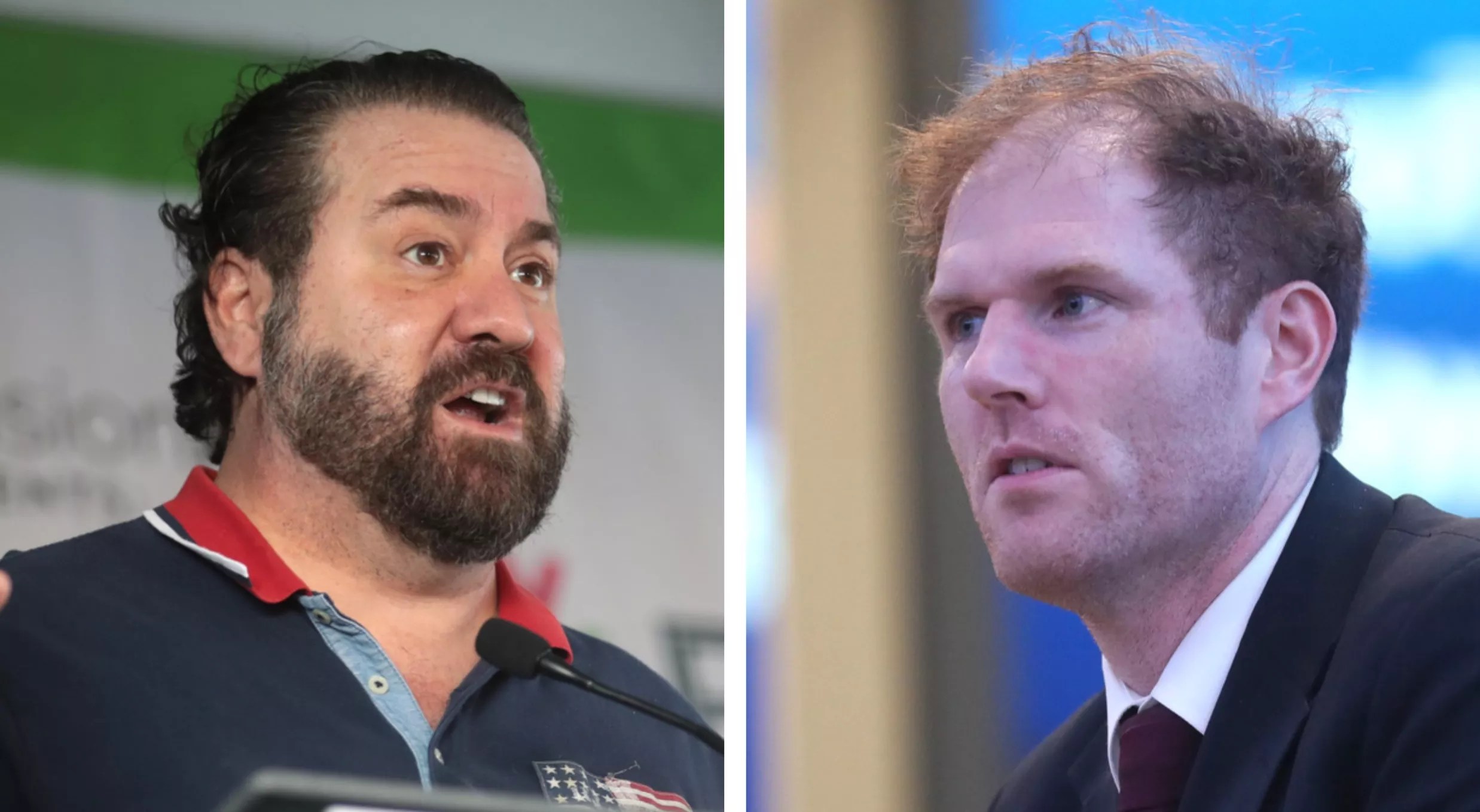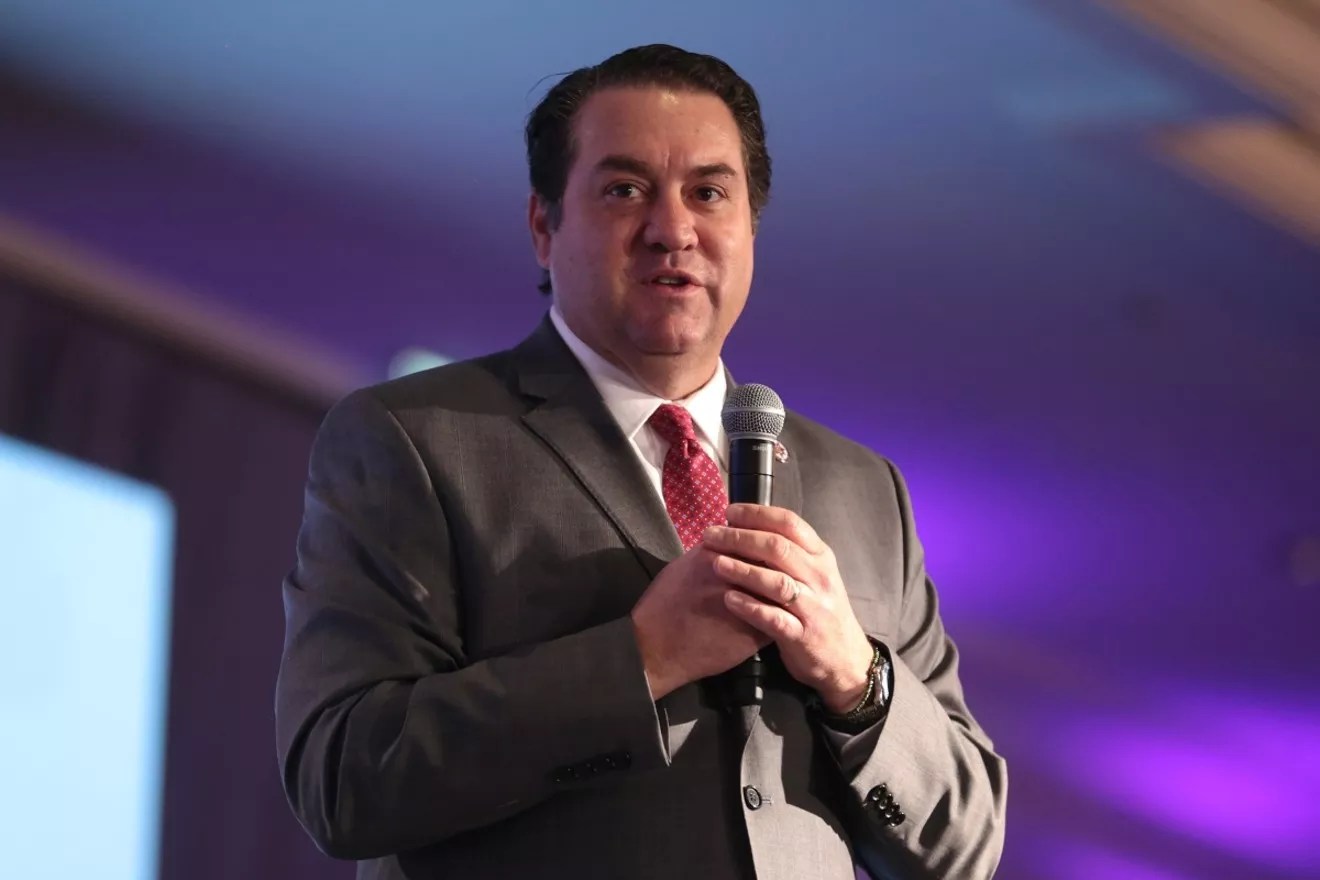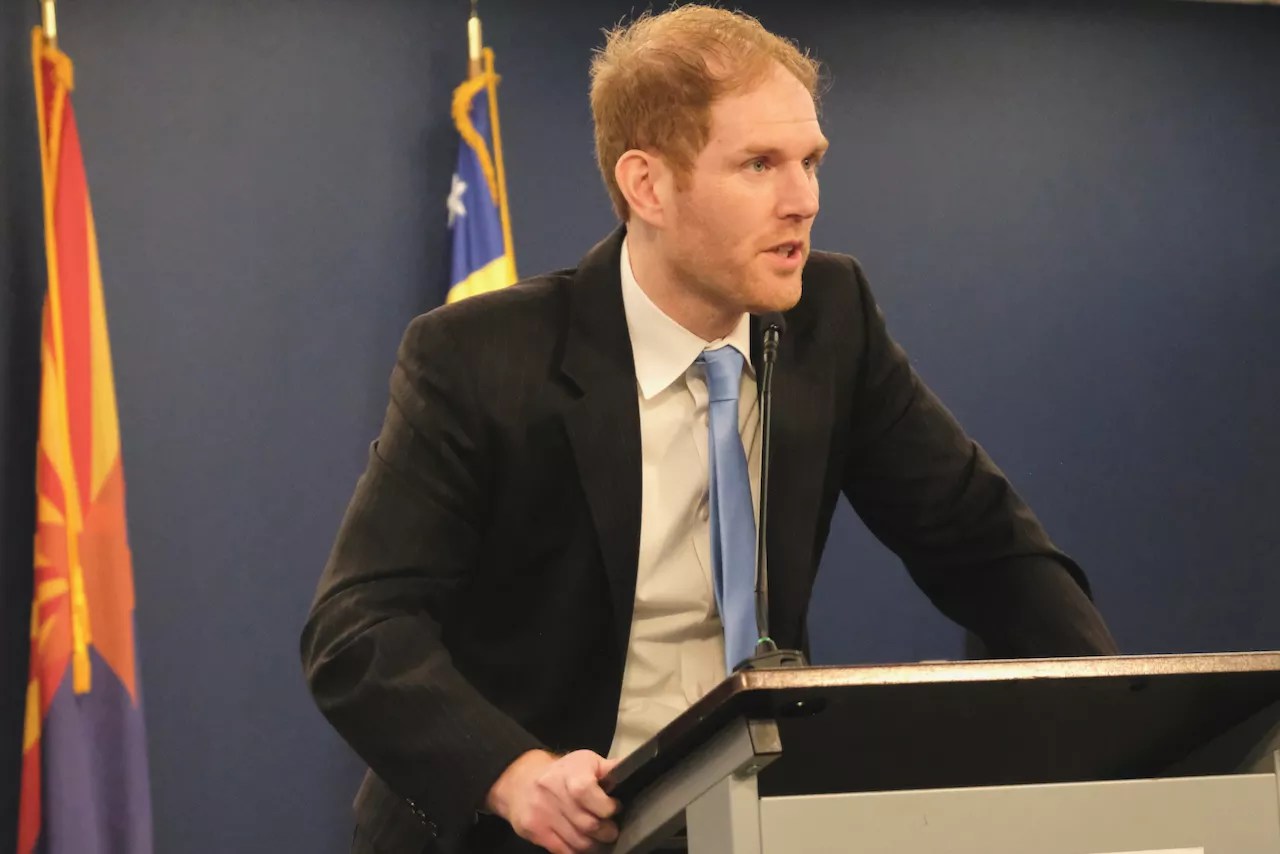
Photos by Gage Skidmore/Flickr/CC BY-SA 2.0

Audio By Carbonatix
Last year, Maricopa County Recorder Stephen Richer blasted former Republican Arizona Attorney General Mark Brnovich in an interview, claiming Brnovich used his office to “persecute” county election workers.
Now, according to court records, Brnovich is taking legal steps that might presage a defamation lawsuit against Richer.
On Oct. 9, an attorney for Brnovich sued Richer’s office to demand a variety of public records related to comments Richer made in an interview with a Bloomberg News reporter in November 2023. The recorder’s office has since completed that record request, turning over more than 3,000 pages of documents, and the lawsuit has been withdrawn. But questions loom.
What will Brnovich do next? Is Richer, a Republican who has defended the county and state against election conspiracy theories and who lost his primary election to an election skeptic, about to be hit with a defamation suit?
Media law experts and First Amendment attorneys contacted by New Times think that’s possible.
Gregg Leslie, the executive director of the First Amendment Clinic at Arizona State University’s Sandra Day O’Connor College of Law, said “it could” lead to a defamation suit. First Amendment scholar and retired media law professor Joe Russomanno agreed.
“I can’t read his mind, but it seems entirely possible,” Russomanno said. “It would make sense to speculate that that is a very possible next step. That the reason … he wants these records is to see exactly what Richer said. And very possibly then proceed from there.”
Brnovich seemingly has not yet decided on that next step. Phoenix New Times emailed attorney Dennis Wilenchik, who represented Brnovich in the public records case, to ask if a defamation suit is in the offing.
“Will let u know,” Wilenchik replied.

Former Arizona Attorney General Mark Brnovich.
Gage Skidmore/Creative Commons
What’s this all about?
The bad blood between the two prominent Republicans goes back at least two years.
In April 2022, Brnovich released a widely derided “interim report” about potential fraud in the 2020 election. The report criticized the county for being uncooperative and claimed to identify issues with voter signature verification, ballot handling and the use of private grant money to fund the election.
At the time, Brnovich was playing out his last few months in office while mounting a run for the U.S. Senate, ultimately losing to Blake Masters in the Republican primary. In a joint letter to Brnovich that was made public, Richer and the Maricopa County Board of Supervisors excoriated the attorney general for his interim report’s failings and misrepresentations.
According to the letter, the report “spread misinformation and seed doubt, which has led to renewed threats and harassment of County election staff.” It told Brnovich that he “omitted pertinent information, misrepresented facts, and cited distorted data to seed doubt about the conduct of elections in Maricopa County and that “the 2020 election was fair and the results indisputable.”
The letter was particularly pointed. It accused Brnovich of issuing his report to “score cheap political points” and criticized one of the report’s assertions as “intellectually insulting to anyone who has taken the LSAT (presumably you).”
“We should not have to remind you of your oaths. Yet here we are,” the letter concluded. “You are not just an ordinary politician. You are the state’s top prosecutor, and you are held to a different standard.”
A month after Brnovich left office in early 2023, new Democratic Attorney General Kris Mayes released documents showing that Brnovich’s investigators “did not uncover any criminality or fraud” in the 2020 election. As a result, several complaints against Brnovich were filed with the Arizona State Bar. According to State Bar spokesperson Joe Hengemuehler, those complaints are now “closed and have no public disposition.”
The specter of those complaints followed Brnovich to a new position at his current law firm, Boies Schiller Flexner, prompting Bloomberg News reporter Justin Wise to interview Richer about the ethics probe. In the article, Richer said Brnovich “could have used his position as top prosecutor of the state to set the record straight that Arizona’s November 2020 election wasn’t stolen.”
“Instead,” Wise wrote, periodically quoting Richer, “Brnovich used his office to ‘persecute’ election workers for political purposes and ‘that’s disgusting.'”
Six months later, Brnovich filed his records request with Richer’s office.

In emails provided to former Arizona Attorney General Mark Brnovich via public records request, Maricopa County Recorder Stephen Richer derides election lawsuits filed by several prominent Republicans after the 2022 election.
Katya Schwenk
What’s in the records?
Brnovich’s records request, reproduced in his lawsuit against the recorder’s office, was long and detailed.
It demanded the “source of Richer’s comments on Brnovich using his office to ‘persecute’ election workers for political purposes” and “statements made to the media about Brnovich’s role in Arizona’s 2020 election.” Brnovich also requested evidence of threats made to, “vile emails” received by and “emotional breakdowns” experienced by election workers because of and related to Brnovich’s actions.
The request sat unfulfilled for months, leading to Brnovich’s public records suit. Taylor Kinnerup, spokesperson for the Maricopa County Recorder’s Office, said the delay was the result of the office switching to a new system after receiving “an unprecedented volume of records requests and subpoenas” since 2020. The request was fulfilled in mid-October.
New Times also acquired the records provided to Brnovich, most of which contain emails, media interactions and internal documents as well as election-related threats. Included is a 2022 email in which Maricopa County Communications Director Fields Moseley states that “the ‘interim report’ doesn’t accuse election workers or Maricopa County of fraud.”
But few of the records relate directly to Brnovich or even mention him at all. The records do include a flurry of email threats against Richer and other election officials, including Secretary of State Adrian Fontes and Supervisor Bill Gates. Other documents sent to Brnovich include a letter between the assistant attorney general and the election department, signature verification information for voting, everyday internal emails, frequent communications with media organizations and several editions of the Arizona Capitol Times’ Yellow Sheet Report and Arizona Agenda newsletters.
There are some juicy election-related emails among the records, but they pertain to other Arizona politicians. Using his personal email, Richer sent messages to county staff criticizing election lawsuits filed after the 2022 election by four Republicans: Attorney General candidate Abe Hamadeh, Secretary of State candidate Mark Finchem, state Sen. Sonny Borrelli and gubernatorial candidate Kari Lake.
Richer wrote that the lawsuits by Finchem, Borrelli and Lake were “insane,” “are written with the legal clarity of a pro-se criminal defendant with access to the prison’s law library” and “might as well be written in pencil and paper.” The suit from Hamadeh, who lost his race to Mayes by 280 votes, was “the only one that looks like a real contest.” However, Richer wrote he doubted it would succeed, calling it “comically simple” and “bare-bones.”
All four lawsuits failed, though Lake and Hamadeh are still pushing theirs despite running for new positions this election.

The attorney for former Arizona Attorney General Mark Brnovich has not said whether he’ll proceed with a defamation suit against Maricopa County Recorder Stephen Richer.
Gage Skidmore/Flickr
What’s next?
Whether or not Brnovich pursues a defamation case largely hinges on whether those records provided him with ammunition. Wilenchik did not respond to questions asking if he had found anything problematic in the records.
In the public records suit against Richer’s office, Wilenchik wrote that Richer’s comments to Bloomberg had hurt Brnovich’s reputation and “standing in the community” and affected “his future employment opportunities and/or political aspirations.”
If Brnovich does file a defamation suit, it may be an uphill battle. To prove defamation, a public figure such as Brnovich must demonstrate the defendant acted with a reckless disregard for the truth and was beyond negligent. Brnovich’s lawyers would have to prove that Richer was lying, and that he knew he was lying. According to Leslie at ASU, that’s “a difficult thing to maintain in a libel suit.”
Leslie said that while it’s “unusual” for a former public official to sue another public official for defamation, “it’s getting more common.” In fact, it’s not new at all to Richer or Brnovich’s lawyer.
In June 2023, Richer sued Lake for defamation after she accused him of sabotaging her failed bid for governor in 2022. This March, Lake’s lawyers stopped defending the suit and requested a default judgment. By giving up, Lake legally admitted that she defamed Richer, though she has continued to claim the opposite publicly. The two sides are now squabbling over damages, with Wilenchik representing Lake.
Now, depending on what Brnovich decides to do, Richer could go from being a plaintiff in a defamation case to being a defendant. If he’s worried, he’s not saying. New Times asked Richer’s office if Richer was concerned about Brnovich’s intentions. Kinnerup did not directly respond, only reiterating that the office completed its “statutory obligation to fulfill records requests.”